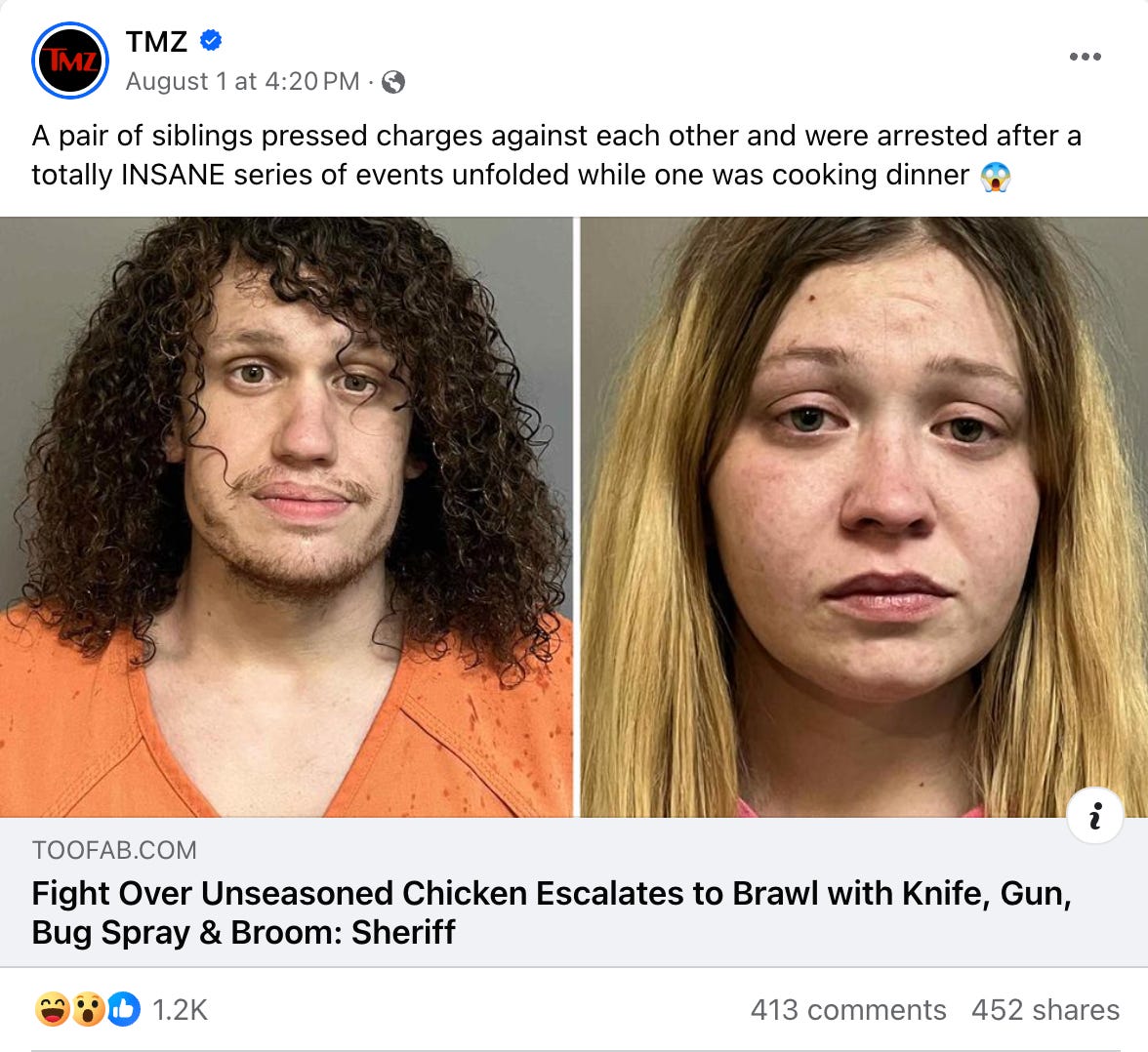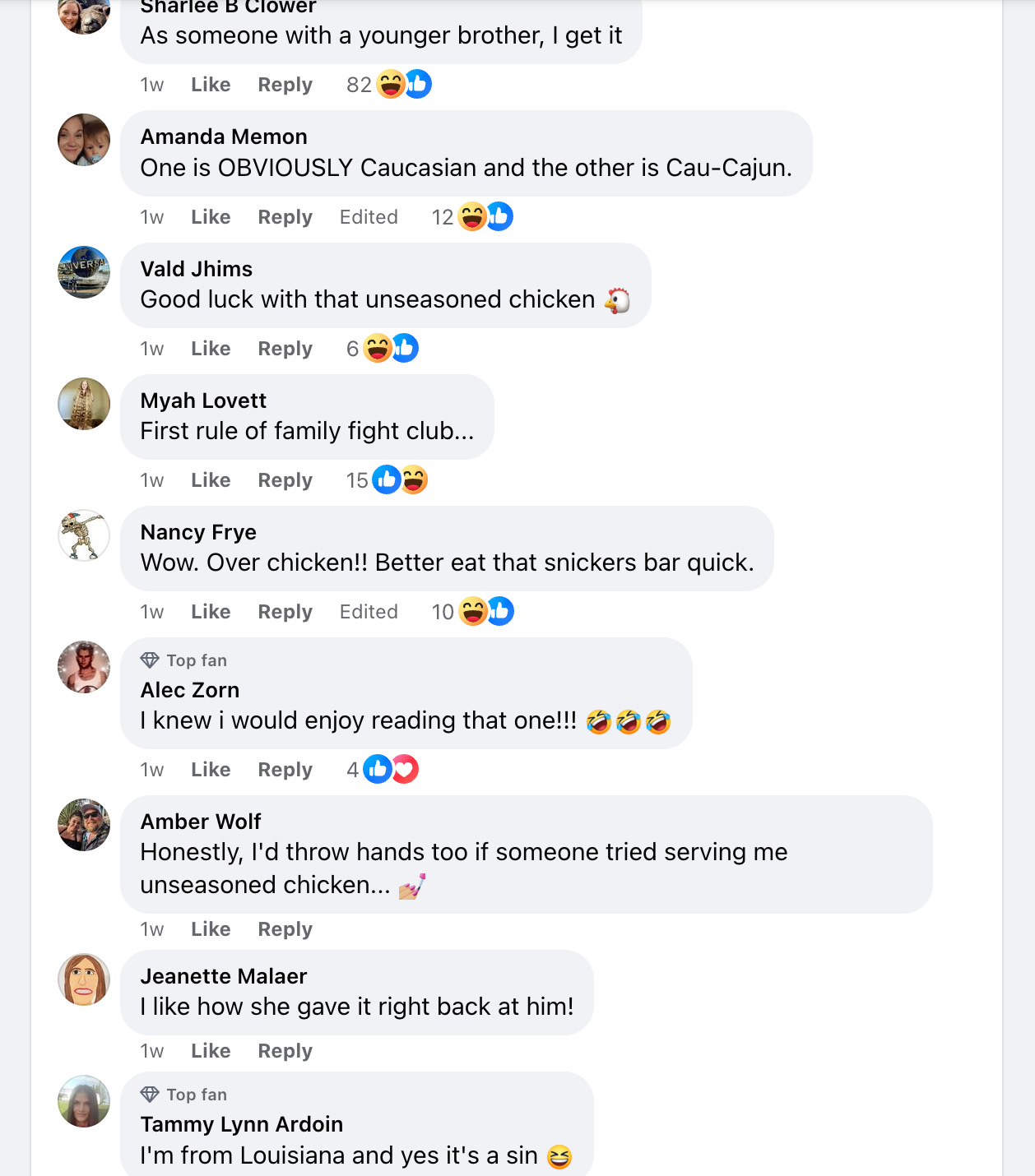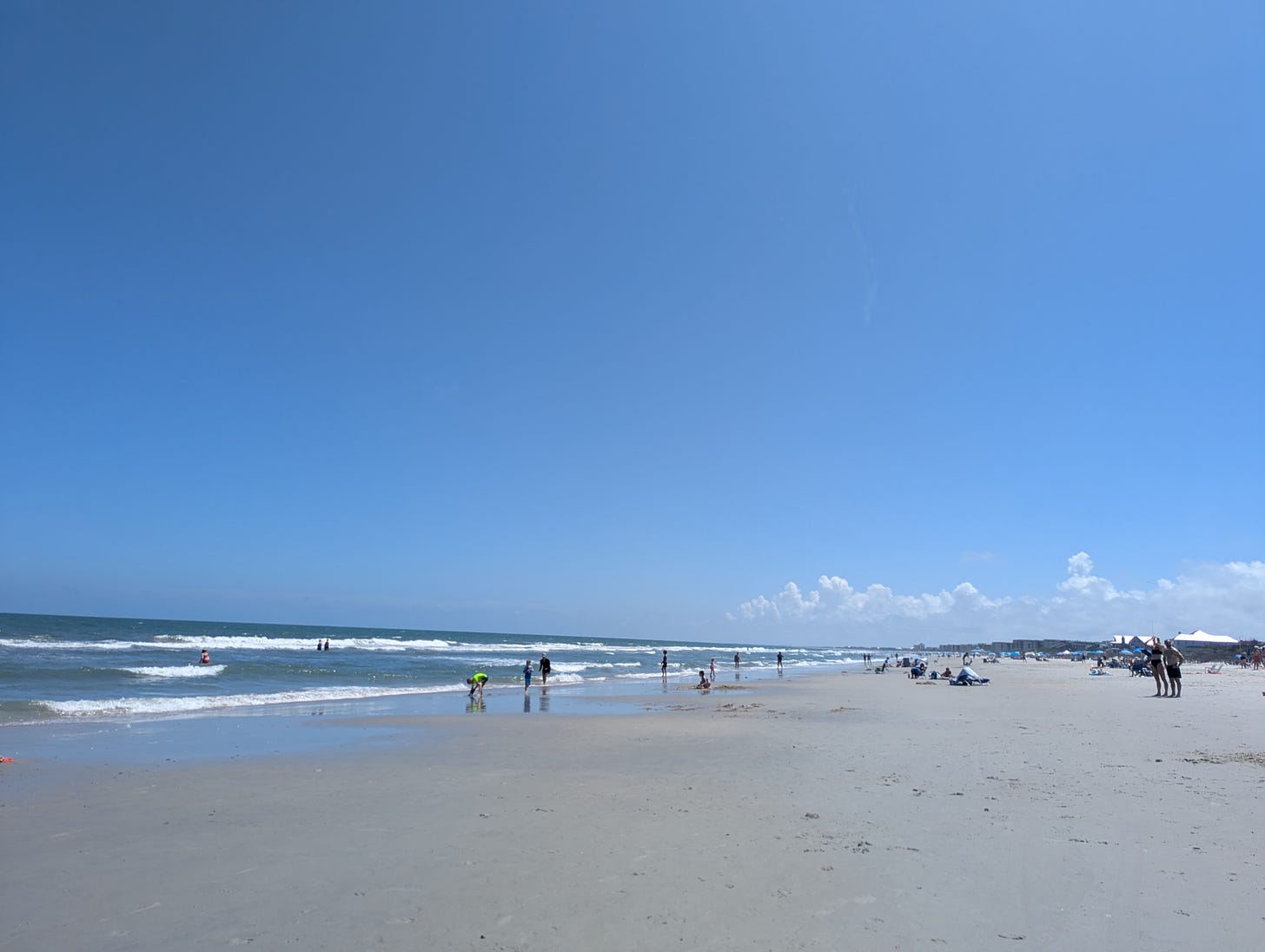Nine days ago, one of my sisters texted my mom and my sisters the link to a local news article with the message: “I don’t know if y’all remember them, but these are our cousins Allen and Hope. What in the world is up with this situation? LOL!”
At first, we laughed. I mean, the story is hilarious. I immediately forwarded the ridiculous article to my besties with the opening line: “Well, if anyone is having a bad day, this should cheer you up.” The story, reminiscent of an episode of The Jerry Springer Show, was outlandish with its insane turn of events that started with a disagreement over unseasoned chicken between two siblings and ended with two assault and battery charges, one sibling against another and vice-versa.
Within a day’s time, TMZ posted the story on its Facebook account, and the Internet did its job: added more fuel to the dumpster fire flames.
The comments section did not disappoint either:
One of my best friends had the perfect response: “A tragicomedy, for sure. We laugh to keep from crying.” She’s right.
I’ve been thinking about these two humans lately and how detached I am from their lives. Although we are family by blood (my grandmother’s brother’s grandchildren), they are not a part of my inner circle or my chosen family.
I tried to recall the last time I even saw the two. I have fuzzy memories of Allen being a demanding and emotional child, and I remember hearing the word “autistic” for the first time in my life as the adults discussed his distressed state, trying to figure out how to “deal with” and calm the inconsolable, non-verbal little boy. Oddly, I don’t have any distinct memories of Hope.
***
My mother wouldn’t allow us to visit Allen and Hope’s grandmother’s house on account of her practice of “witchcraft.” With my dad being a minister and all, my parents were reasonably fearful of “Satan’s power” and possible influence on us. And though I don’t remember feeling particularly scared of this family, I do remember sensing a darkness over them and feeling uneasy around them.
One time, when I was in my pre-teens, my aunt had to make a pit stop at their trailer, just down the dirt road from my granny’s house in Browns Ferry, South Carolina, located about thirty miles inland from Georgetown, my birthplace. My siblings and I were under her care that weekend, and I remember walking into their home residence. My body, hot from the blazing sun and humidity, perspired a considerable amount just from the walk between the car, parked on the front lawn, to the aluminum front door.
The interior was a rectangular cave lit by a television screen and a stove top light. The windows were covered with blankets “to keep the cold inside,” and the place was littered with high-processed food products, cigarette butts, and sugary sodas. The inhabitants appeared zombie-like, malnourished in mind, body, and soul.
The Sad Place was void of laughter, joy, and—life.
And as I think back to that visit, I think about how, after all that the human race had done to progress our species up to that point, there was this extension of my family, dwelling in a cave like our ancient ancestors: the homo sapiens, except they seemed to be disinterested in work, art, or self-improvement. A considerable step backward, indeed. But this example is one of many in my extended family and in our country.
My relatives were present-day Ewells (from Harper Lee’s To Kill a Mockingbird), living off the government, taking advantage of charities, and filing and winning dubious lawsuits in order to sustain and maintain their free-loader lifestyle.
My God-fearing grandmother, bless her, would prepare made-from-scratch meals for them to ensure they were nourished. She did not judge their lifestyle or speak to them harshly, rather she loved them and shared the Word of God with them and prayed for them, her little brother’s tribe, steadfastly.
I often wonder what would happen if our society (and the people of the Internet) would choose to display the same love and affection as my dear, sweet granny. Instead of pointing fingers in mockery and amusement of damaged individuals, what would happen if we offered a lending hand, guidance, and love?
***
The topic of generational poverty and trauma comes up frequently during intimate conversations with my sisters and my first-cousins. We often ask ourselves, “How did we make it out?”
The answer is complicated.
Yes, we owe my mother largely for protecting us from nefarious influences, from the fringes of our feral family, for it was within those boundary lines where drug addiction, sexual abuse, alcoholism, mental illness, poverty, immorality, and/or poor health conditions multiplied and persisted.
My siblings, first-cousins, and I were all within a stone’s throw away from this lurking “Evil,” or as I view it now, an inevitable demise. And yet, we didn’t fall into that deep, dark abyss. We dodged the bullet (mostly).
And as I set out on the pathway to “break the cycle” in young adulthood, I recall having what I can now label as “survivor’s guilt.”
One particular memory comes into focus when, during a graduate-level education class at North Carolina State University, I cried in front of my peers while reading aloud a journal response to a prompt that asked, “What are your fears as a teacher-in-training?”
My answer was this: I was scared that my family would think that I was “too good” for them and would write me off, cut me out of the family. I divulged that all I wanted was to make them proud and to do better for them and for myself.
I’ll never forget looking up to read my professor’s and my peers’ facial expressions and realizing that none of them empathized, but all of them sympathized. Ouch. I knew this by the welling of tears in their eyes and the nervous shifting of their bodies in their seats. No one knew what to say to assuage my worry, including my professor.
I felt like a freak, a foreigner, an imposter.
There I was, a first-generation college student and the first in my family to hold down a “real job” with benefits and steady pay, unloading my trauma on an inexperienced and unprepared audience. The experience was alienating and enlightening.
At 22, I started making more money than my parents ever did as a public school teacher. Straight away, I took on the role and responsibility of “paying it forward” to my younger siblings. I did this by buying school supplies, assisting with college applications and FAFSA, and purchasing “experiences,” like an admission ticket to a local museum or a plane ticket to NYC.
I wanted my brother and three sisters to see and experience “the world,” the world outside of the Bible Belt, the world that was welcoming and accepting of all kinds, the world that they could thrive in.
Above all, I wanted them to know that they could make it out, too. Just like me. And, they did—with the exception of my brother.
We are modern-day miracles.
***
My great-uncle, Allen and Hope’s grandfather, passed away last month while my little family and I were visiting my South Carolina family. They live near the beach, so visiting them is also like being on a vacation (or as parents of young children refer to vacations: “a nice change of scenery").
When I heard the somber news, my initial thought was that I’d attend the funeral because it was the “right thing to do.” But, as I began to learn more details about the service arrangements and began piecing together the day and how it would mostly be swallowed up by traveling to and sitting with people I hadn’t seen in ten-plus years, I began to feel uncertain.
My husband had been working remotely all week, unable to join us on the beach, unable to be a part of the magical memory-making with our two precious daughters, who without a doubt are falling in love with the same place that I, too, had fallen in love with many, many summers ago.
What really mattered became clear: I’d spend our last vacation day with my own family, instead of going to the funeral of a man who I basically had no relationship with (other than the information provided on a family tree).
And this decision is exactly the type of decision that doesn’t get talked about enough: the decision to estrange or cut off family ties in order to break the cycles that did not serve past generations, does not serve the present generation, and will not serve future generations.
With this “no,” I immediately felt this enormous amount of guilt, shame, embarrassment, pain, grief, and sadness. I wish it could have been an easy “yes,” not a complicated “no.” Every decision, similar in form, is excruciating to make because there is this unrealistic expectation in our society to be loyal to a disloyal family—to be sympathetic towards an unsympathetic people. It’s a real mindf*ck.
I don’t regret my decision.
My family and I had one of the best days ever, building sand castles, searching for shark teeth and seashells, jumping over the breakers, cozying up together, wrapped in warm beach towels, stealing kisses, and whispering “I love yous” to one another in the hot, radiant sun.
Days, like this perfect beach day with the most important people in my life, are days that I refer to as “healing days,” the days where I am consoling my wounded inner child, where I am comforting my own offspring, and where I am telling my ancestors that I have got it from here.
Thank y’all so much for being here! If you liked what you read, please tap that little heart below, leave a comment, re-stack this post, and/or consider buying me a coffee or upgrading your subscription. Your participation and support motivate me to keep doing the thing!







Beautiful story. So much respect to you for doing the heavy lifting in healing your lineage. Most of them won’t ever know it was you, but their lives, and those of the children you teach, will forever be different for it. 🙌